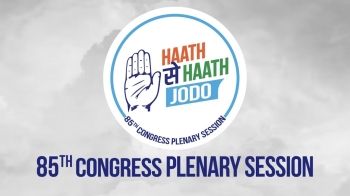
.png) Dr Suresh Mathew
Dr Suresh Mathew

“It is your reaction to adversity, not the adversity itself, that determines how your life story will develop.” The Congress party seems to have taken a leaf out of this saying as is exemplified during its 85th plenary session. It is for the first time that the party is out of power for a period of 10 years at a stretch. This has opened its eyes; it knows that 2024 general elections could be its last bus to reach the seat of power and if it fails to catch it, the result will be ominous.
Coming to terms with the reality, the party has rightly made it clear that it is ready to make compromises for the “unity of secular and socialist forces.” It has announced its willingness to go all out to identify, mobilise and align with like-minded secular forces to take on the NDA (rather the BJP) on common ideological grounds.
The party’s determination to come back to power has found its ex
The decision to go for caste census, along with the general Census, if returned to power, could have some impact on its electoral prospects. In the absence of caste census, upper castes apparently stand to gain undue advantages; people from the marginalized and the OBCs, though they outnumber upper castes, might not get due share from the Central and State pie. Hence caste census could lead to a major churning in the society as it will bring out the real composition of the population. A separate resolution on social justice, promising a Ministry for OBCs and creation of a National Council for Social Justice, was adopted at the plenary. Yet another promise is a social security framework, “Sampoorna Samajik Suraksha, with legal guarantees for minimum income for the poor.
All said and done, the credibility of the promises will have to be tested on the ground. Earlier too, the party had taken far-reaching decisions. But it has failed to implement the proposed changes even in its internal forums. The party which opted for election to its president’s post back-pedaled in constituting Congress Working Committee. It has opted for the nomination route, rather than election mode, which could lead to favouratism at the cost of meritorious people coming to the top decision-making body.
The proof of the success of the plenary decisions will be known in the coming Assembly and general elections. The results from the three North-East states do set alarm bells ringing, though a few by-poll results bring relief to the party. The results make one thing clear: Congress has been made to bite the dust in the North-East by its own former members. Unless the party is able to hold its folks together, plenary sessions will not do any good to it.